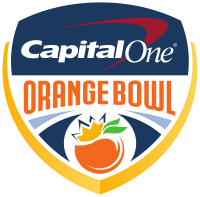Capital One Orange Bowl
| Orange Bowl | |
|---|---|
| Capital One Orange Bowl | |
 |
|
| Stadium | Hard Rock Stadium |
| Location | Miami Gardens, Florida (Dec. 1996–1998, 2000–present) |
| Previous stadiums | Miami Field (1935–1937) Miami Orange Bowl (1938–Jan. 1996, 1999) |
| Previous locations | Miami, Florida (1935–Jan. 1996, 1999) |
| Operated | 1935–present |
| Conference tie-ins |
ACC (1999–present) SEC/Big Ten/Notre Dame (Dec. 2014–present) CFP (Dec. 2014–present) |
| Previous conference tie-ins |
Big Eight (1976–Jan. 1996) Big East (1999–2006) BCS (1999-Jan. 2014) |
| Payout | US$35 million/conference (As of 2009[update]) |
| Sponsors | |
| Former names | |
|
Orange Bowl (1935–1988)
Federal Express Orange Bowl (1989–1993) FedEx Orange Bowl (1994–2010) Discover Orange Bowl (2011–Jan. 2014) |
|
| 2016 season matchup | |
| Michigan vs. Florida State (Florida State 33–32) | |
| 2017 season matchup | |
| TBD (December 30, 2017) | |
The Orange Bowl is an annual American college football bowl game played at Hard Rock Stadium in Miami Gardens, Florida. This bowl game is sponsored by Capital One and part of the College Football Playoff. It has been played annually since January 1, 1935. The Orange Bowl, along with the Sugar Bowl and the Sun Bowl, is the second-oldest bowl game in the country, behind the Rose Bowl (first played 1902, played annually since 1916).
In its early years, the Orange Bowl had no defined conference tie-ins; it often pitted a team from the southeastern part of the country against a team from the central or northeastern states. From the 1950s until the mid-1990s, the Orange Bowl had a strong relationship with the Big 8 Conference. The champion (or runner-up in years in the “no-repeat” rule was invoked) was invited to the bowl game in most years during this time; the 1979 Orange Bowl even had two representatives from the Big 8. Opponents of the Big 8 varied; but were often major independents, runners-up in the Southeastern Conference, or champions of the Atlantic Coast Conference.
In the 1990s, the Orange Bowl was a member of the Bowl Coalition, but kept its Big 8 tie-in. It was later a member of the Bowl Alliance. From 1998 to 2013, The Orange Bowl was a member of the now-defunct Bowl Championship Series (BCS). The Orange Bowl served as the BCS National Championship Game in 2001 and 2005. However, beginning with the 2006 season, the BCS National Championship Game became a stand-alone event, hosted by the local bowl organization about one week following the New Year's Day bowl games (including the Orange Bowl). Under that format the Orange Bowl Committee hosted two separate games in both 2009 (the 2009 Orange Bowl on January 1 and the 2009 BCS National Championship Game on January 8) and in 2013 (the 2013 Orange Bowl on January 1 and the 2013 BCS National Championship Game on January 7), all at Sun Life Stadium. The BCS ended after the 2013 season, being replaced by the current College Football Playoff.
...
Wikipedia
